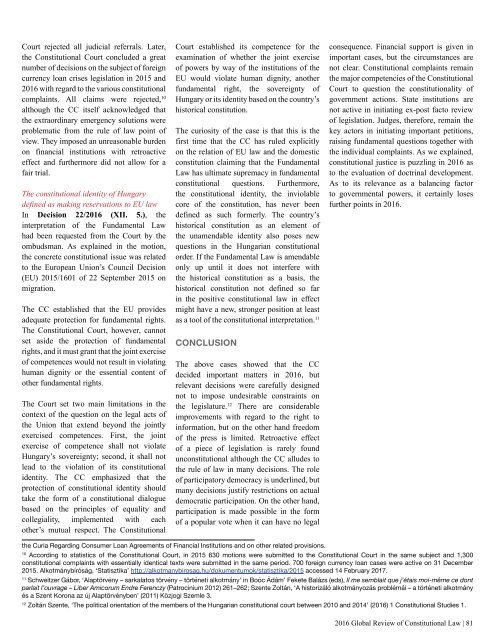2016 Global Review of Constitutional Law
I-CONnect–Clough Center collaboration.
I-CONnect–Clough Center collaboration.
Create successful ePaper yourself
Turn your PDF publications into a flip-book with our unique Google optimized e-Paper software.
Court rejected all judicial referrals. Later,<br />
the <strong>Constitutional</strong> Court concluded a great<br />
number <strong>of</strong> decisions on the subject <strong>of</strong> foreign<br />
currency loan crises legislation in 2015 and<br />
<strong>2016</strong> with regard to the various constitutional<br />
complaints. All claims were rejected, 10<br />
although the CC itself acknowledged that<br />
the extraordinary emergency solutions were<br />
problematic from the rule <strong>of</strong> law point <strong>of</strong><br />
view. They imposed an unreasonable burden<br />
on financial institutions with retroactive<br />
effect and furthermore did not allow for a<br />
fair trial.<br />
The constitutional identity <strong>of</strong> Hungary<br />
defined as making reservations to EU law<br />
In Decision 22/<strong>2016</strong> (XII. 5.), the<br />
interpretation <strong>of</strong> the Fundamental <strong>Law</strong><br />
had been requested from the Court by the<br />
ombudsman. As explained in the motion,<br />
the concrete constitutional issue was related<br />
to the European Union’s Council Decision<br />
(EU) 2015/1601 <strong>of</strong> 22 September 2015 on<br />
migration.<br />
The CC established that the EU provides<br />
adequate protection for fundamental rights.<br />
The <strong>Constitutional</strong> Court, however, cannot<br />
set aside the protection <strong>of</strong> fundamental<br />
rights, and it must grant that the joint exercise<br />
<strong>of</strong> competences would not result in violating<br />
human dignity or the essential content <strong>of</strong><br />
other fundamental rights.<br />
The Court set two main limitations in the<br />
context <strong>of</strong> the question on the legal acts <strong>of</strong><br />
the Union that extend beyond the jointly<br />
exercised competences. First, the joint<br />
exercise <strong>of</strong> competence shall not violate<br />
Hungary’s sovereignty; second, it shall not<br />
lead to the violation <strong>of</strong> its constitutional<br />
identity. The CC emphasized that the<br />
protection <strong>of</strong> constitutional identity should<br />
take the form <strong>of</strong> a constitutional dialogue<br />
based on the principles <strong>of</strong> equality and<br />
collegiality, implemented with each<br />
other’s mutual respect. The <strong>Constitutional</strong><br />
Court established its competence for the<br />
examination <strong>of</strong> whether the joint exercise<br />
<strong>of</strong> powers by way <strong>of</strong> the institutions <strong>of</strong> the<br />
EU would violate human dignity, another<br />
fundamental right, the sovereignty <strong>of</strong><br />
Hungary or its identity based on the country’s<br />
historical constitution.<br />
The curiosity <strong>of</strong> the case is that this is the<br />
first time that the CC has ruled explicitly<br />
on the relation <strong>of</strong> EU law and the domestic<br />
constitution claiming that the Fundamental<br />
<strong>Law</strong> has ultimate supremacy in fundamental<br />
constitutional questions. Furthermore,<br />
the constitutional identity, the inviolable<br />
core <strong>of</strong> the constitution, has never been<br />
defined as such formerly. The country’s<br />
historical constitution as an element <strong>of</strong><br />
the unamendable identity also poses new<br />
questions in the Hungarian constitutional<br />
order. If the Fundamental <strong>Law</strong> is amendable<br />
only up until it does not interfere with<br />
the historical constitution as a basis, the<br />
historical constitution not defined so far<br />
in the positive constitutional law in effect<br />
might have a new, stronger position at least<br />
as a tool <strong>of</strong> the constitutional interpretation. 11<br />
CONCLUSION<br />
The above cases showed that the CC<br />
decided important matters in <strong>2016</strong>, but<br />
relevant decisions were carefully designed<br />
not to impose undesirable constraints on<br />
the legislature. 12 There are considerable<br />
improvements with regard to the right to<br />
information, but on the other hand freedom<br />
<strong>of</strong> the press is limited. Retroactive effect<br />
<strong>of</strong> a piece <strong>of</strong> legislation is rarely found<br />
unconstitutional although the CC alludes to<br />
the rule <strong>of</strong> law in many decisions. The role<br />
<strong>of</strong> participatory democracy is underlined, but<br />
many decisions justify restrictions on actual<br />
democratic participation. On the other hand,<br />
participation is made possible in the form<br />
<strong>of</strong> a popular vote when it can have no legal<br />
consequence. Financial support is given in<br />
important cases, but the circumstances are<br />
not clear. <strong>Constitutional</strong> complaints remain<br />
the major competencies <strong>of</strong> the <strong>Constitutional</strong><br />
Court to question the constitutionality <strong>of</strong><br />
government actions. State institutions are<br />
not active in initiating ex-post facto review<br />
<strong>of</strong> legislation. Judges, therefore, remain the<br />
key actors in initiating important petitions,<br />
raising fundamental questions together with<br />
the individual complaints. As we explained,<br />
constitutional justice is puzzling in <strong>2016</strong> as<br />
to the evaluation <strong>of</strong> doctrinal development.<br />
As to its relevance as a balancing factor<br />
to governmental powers, it certainly loses<br />
further points in <strong>2016</strong>.<br />
the Curia Regarding Consumer Loan Agreements <strong>of</strong> Financial Institutions and on other related provisions.<br />
10<br />
According to statistics <strong>of</strong> the <strong>Constitutional</strong> Court, in 2015 630 motions were submitted to the <strong>Constitutional</strong> Court in the same subject and 1,300<br />
constitutional complaints with essentially identical texts were submitted in the same period. 700 foreign currency loan cases were active on 31 December<br />
2015. Alkotmánybíróság, ‘Statisztika’ http://alkotmanybirosag.hu/dokumentumok/statisztika/2015 accessed 14 February 2017.<br />
11<br />
Schweitzer Gábor, ‘Alaptörvény – sarkalatos törvény – történeti alkotmány’ in Boóc Ádám’ Fekete Balázs (eds), Il me semblait que j’étais moi-même ce dont<br />
parlait l’ouvrage – Liber Amicorum Endre Ferenczy (Patrocinium 2012) 261–262; Szente Zoltán, ‘A historizáló alkotmányozás problémái – a történeti alkotmány<br />
és a Szent Korona az új Alaptörvényben’ (2011) Közjogi Szemle 3.<br />
12<br />
Zoltán Szente, ‘The political orientation <strong>of</strong> the members <strong>of</strong> the Hungarian constitutional court between 2010 and 2014’ (<strong>2016</strong>) 1 <strong>Constitutional</strong> Studies 1.<br />
<strong>2016</strong> <strong>Global</strong> <strong>Review</strong> <strong>of</strong> <strong>Constitutional</strong> <strong>Law</strong> | 81


